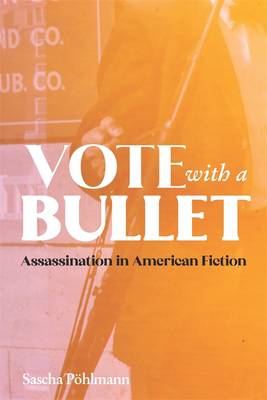
Bedankt voor het vertrouwen het afgelopen jaar! Om jou te bedanken bieden we GRATIS verzending (in België) aan op alles gedurende de hele maand januari.
- Afhalen na 1 uur in een winkel met voorraad
- In januari gratis thuislevering in België
- Ruim aanbod met 7 miljoen producten
Bedankt voor het vertrouwen het afgelopen jaar! Om jou te bedanken bieden we GRATIS verzending (in België) aan op alles gedurende de hele maand januari.
- Afhalen na 1 uur in een winkel met voorraad
- In januari gratis thuislevering in België
- Ruim aanbod met 7 miljoen producten
Zoeken
Omschrijving
Vote with a Bullet is the first systematic study of assassination in American fiction. It proffers not only a fundamental overview of the genre but also an argument about its larger cultural, aesthetic, and political significance in the present moment as well as in the respective historical contexts of the works themselves.
The study argues that American assassination fiction is a symbolic condensation of the larger conflict between individual and society that is at the heart of modern democracy, and that has been especially contested in the democratic culture of the US. Starting with Henry James's The Princess Casamassima (1886) and ending with Noah Hawley's The Good Father (2012), the chapters analyze twelve works ranging from canonical classics to popular genre fiction. A conclusion considers Thomas Pynchon's Against the Day (2006). The book describes the loose continuum of assassination fiction as an imaginary laboratory in which fantasies of individual empowerment and social unity play out in different ways, negotiating the tension between individualism and mass society in a democracy that is based on the former but must restrict it to preserve the latter. Furthermore, the study connects the imaginary of assassination with a variety of related themes such as hegemonic masculinity and whiteness, electoral and non-electoral political choice, agency panic, subjectivity, as well as conspiracies and conspiracy theory.
The study argues that American assassination fiction is a symbolic condensation of the larger conflict between individual and society that is at the heart of modern democracy, and that has been especially contested in the democratic culture of the US. Starting with Henry James's The Princess Casamassima (1886) and ending with Noah Hawley's The Good Father (2012), the chapters analyze twelve works ranging from canonical classics to popular genre fiction. A conclusion considers Thomas Pynchon's Against the Day (2006). The book describes the loose continuum of assassination fiction as an imaginary laboratory in which fantasies of individual empowerment and social unity play out in different ways, negotiating the tension between individualism and mass society in a democracy that is based on the former but must restrict it to preserve the latter. Furthermore, the study connects the imaginary of assassination with a variety of related themes such as hegemonic masculinity and whiteness, electoral and non-electoral political choice, agency panic, subjectivity, as well as conspiracies and conspiracy theory.
Specificaties
Betrokkenen
- Auteur(s):
- Uitgeverij:
Inhoud
- Aantal bladzijden:
- 206
- Taal:
- Engels
- Reeks:
- Reeksnummer:
- nr. 24
Eigenschappen
- Productcode (EAN):
- 9781640141131
- Verschijningsdatum:
- 19/08/2021
- Uitvoering:
- Hardcover
- Formaat:
- Genaaid
- Afmetingen:
- 152 mm x 231 mm
- Gewicht:
- 453 g

Alleen bij Standaard Boekhandel
+ 354 punten op je klantenkaart van Standaard Boekhandel
Beoordelingen
We publiceren alleen reviews die voldoen aan de voorwaarden voor reviews. Bekijk onze voorwaarden voor reviews.









